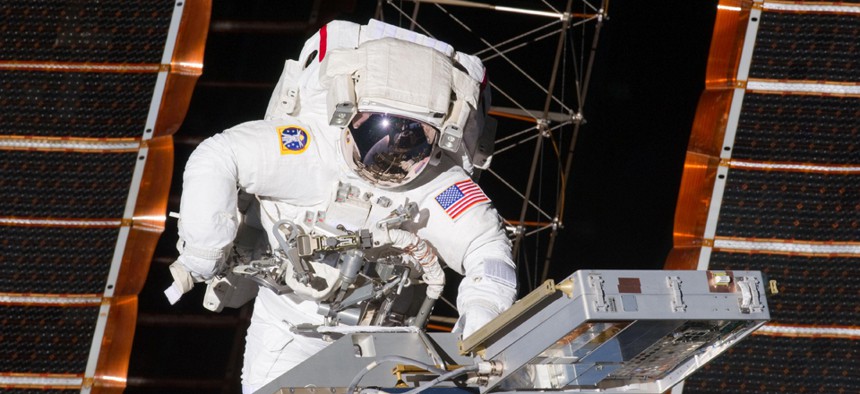Space Isn’t Just the Final Frontier -- It’s a Dangerous Venue for Geopolitical Brinksmanship

Is this man the new warfighter? NASA
Senior officials are not paying enough attention to potential problems in orbit, security analyst says.
Whether it’s Russia’s military adventures in the Crimea or China’s less-than-neighborly attempt to exert influence in the South China Sea, international tensions are on the rise—and if those tensions lead to accidents in space, neither the community of nations nor the US has the tools to prevent such a conflict from spinning out of control and costing billions.
American national security analyst Micah Zenko of the Council on Foreign Relations outlines these concerns in a new report on the growing threat of dangerous space incidents. He compares the problem to cybersecurity, another relatively new concern that has attracted attention from the world’s security leaders. In comparison, he says that senior officials are not paying enough attention to potential problems in space, where there is much less room for error.
“The difference is that cyber domain can be degraded [by cyber attacks,] but space just falls off a cliff,” Zenko says of a scenario where satellites are damaged intentionally or by accident. “Once the debris is there [in orbit] it’s there forever unless you bring it back down or burn it up, and we are many years from anything like that."
Zenko is concerned about scenarios where countries like China, North Korea or Iran seek to demonstrate their space capabilities in a crisis by testing or actually deploying anti-satellite weapons. The US, the country most dependent on space technology both commercially and militarily, is particularly vulnerable to an attack like that; private companies spent $225 billion on commercial space activity in 2012, according to the Space Foundation (pdf). Replacing damaged satellite infrastructure isn’t exactly a walk in the park.
And this isn’t just fear-mongering: A Chinese anti-satellite test in 2007 went wrong, creating a cloud of debris that inspired the movie Gravity‘s space-station-shredding catastrophes. China is currently testing technology that involves moving satellites close together in orbit, and no one is sure if they’ll be able to keep such tests under control or what they’ll do if it goes wrong again.
One reason why is that NASA, the US space agency, is forbidden from contact with Chinese space officials, preventing communication about best practices and contingency plans that does occur on other military issues. Currently, the US isn’t even acknowledging China’s space weaponry, or its own. When it comes to nations with which the US has worse relations and less influence, like North Korea and Iran, there is little to do but invest in damage mitigation, upgrade space monitoring, and work to update international space law that hasn’t changed since the 1970s.






